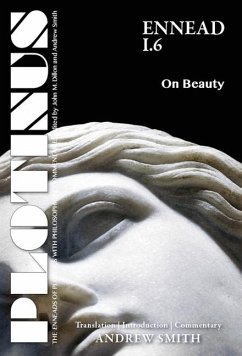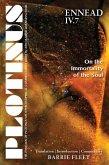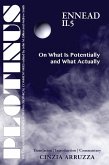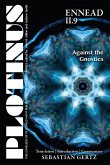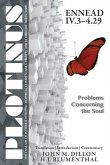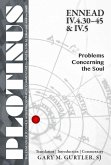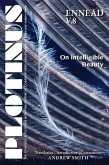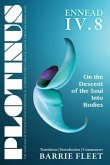"Not only an important document for the history of ancient aesthetics, [On Beauty] also makes for an excellent introduction to Plotinus' thought more generally, especially [given] this readable translation, which nicely captures Plotinus' more rhetorical turns of phrase." --Peter Adamson, Professor of Late Antiquity and Arabic Philosophy, Ludwig-Maximilians-Universität Munich "This new [edition] is very pleasant to read and contains everything needed to grasp the features of this important Plotinian treatise. [It] will be welcomed by a wide range of readers, be they familiar with Plotinus or not." --Alexandrine Schniewind, Professor of Ancient Philosophy, University of Lausanne "Plotinus criticizes the view that beauty consists in symmetry, and interprets it instead in terms of the presence of form, bestowed on physical objects by the activities of souls. Relying on Plato's Symposium and Phaedrus, he traces back the beauty of physical objects to its source in the intelligible world, i.e. the beauty of the Forms (or the Intellect), and, ultimately, to the transcendent Good (or Beauty), which is the cause of intelligible beauty. The apprehension of physical beauty provides us with the starting point for the discovery and active shaping of our inner selves, or, to put it in a different way, for the ascent to intelligible and transcendent Beauty. The Introduction and the Commentary supply a wealth of information in an economic way and are helpful for the newcomer and the specialist alike. The volume will make a valuable reading for anyone interested in the history of aesthetics, in metaphysics, and in the spirituality of late antiquity." --László Bene, Associate Professor Ancient and Medieval Philosophy, Eötvös Loránd University "Smith shows how Plotinus' discussion of beauty relates to his philosophy overall. The commentary contains numerous parallels from other works of Plotinus which helpfully illuminate what is said in I.6." --Anne Sheppard, Professor of Ancient Philosophy, Royal Holloway, University of London "A lucid translation of one of Plotinus' most accessible treatises, with a thorough and informative commentary. In many respects, this book is an ideal introduction to Plotinus' thought." --Michael Griffin, Assistant Professor of Classics and Philosophy, The University of British Columbia
Hinweis: Dieser Artikel kann nur an eine deutsche Lieferadresse ausgeliefert werden.
Hinweis: Dieser Artikel kann nur an eine deutsche Lieferadresse ausgeliefert werden.

